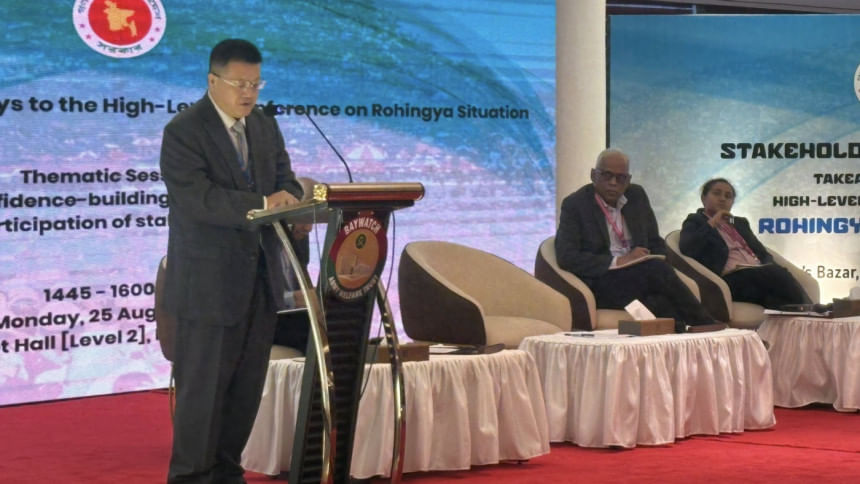Rohingya Return: It’s crucial that Dhaka, Naypyidaw reach consensus

The resolution of the Rohingya crisis must start with consensus between Bangladesh and Myanmar and then be expanded to a wider agreement involving ASEAN countries, donor nations, and UN agencies.
Chinese Ambassador to Bangladesh Yao Wen yesterday made the remark while addressing an international conference in Cox's Bazar, "Stakeholders' Dialogue: Takeaways to the High-Level Conference on Rohingya Situation".
"Any repatriation will be based on bilateral agreements. Bangladesh is now the host; Myanmar is the homeland. Broader consensus must then be built," he said at a session -- confidence building measures.
Referring to his personal involvement in the 2023 pilot repatriation project, Yao said that the process was "extremely challenging" due to differing views among stakeholders.
"Some believe that as long as the Myanmar government remains, it is not the right time for repatriation. But Myanmar is a sovereign state, and its national sovereignty must be respected."
The envoy stressed that halting further influx into Bangladesh would be the most urgent step.
For this, he said, a ceasefire between Myanmar's military and the Arakan Army was crucial.
"We understand the Arakan Army controls over 80 percent of the territory of Arakan state and still wants full control. But who provides them with weaponry, finance, and intelligence? China does not play any role; we don't provide anything to either the Arakan Army or the Myanmar government. However, there is some supply to them from other sources, so all parties need to be part of any agreement; otherwise, a ceasefire cannot be achieved," he said.
Once peace is achieved, Yao said, repatriation could start on a small scale with a few thousand Rohingyas under close monitoring, supported by coordinated development, education, and livelihood projects by China, Bangladesh, ASEAN, and UN agencies.
He also underscored that Rohingya participation was essential. "Any solution must have their agreement and support. Otherwise, everything will be meaningless."
Reaffirming Beijing's commitment, Yao noted that China had already mediated a trilateral mechanism with Bangladesh and Myanmar, hosted several working group meetings, and contributed humanitarian aid projects with the UNHCR and WFP.
"China will never give up. Ending hostilities and achieving consensus between Bangladesh and Myanmar is the only way forward," he said.
Charles Santiago, co-chair of the ASEAN Parliamentarians for Human Rights, said ASEAN and China must shoulder greater responsibility in resolving the crisis.
He warned that the withdrawal of US aid had cut food assistance for Rohingyas from $18 to just $6 per person and urged China, Japan, and others to step up contributions.
"China's role is super key. There is no way out of this unless China chooses to solve it. Will China do it? That's the real question. Only China has the leverage to stop the flow of arms and press for dialogue under ASEAN's five-point consensus," he said.
Earlier, in another session on humanitarian assistance, experts and Rohingya representatives also pressed China to take the lead given its close ties with Myanmar and influence in the region.


 For all latest news, follow The Daily Star's Google News channel.
For all latest news, follow The Daily Star's Google News channel. 



Comments